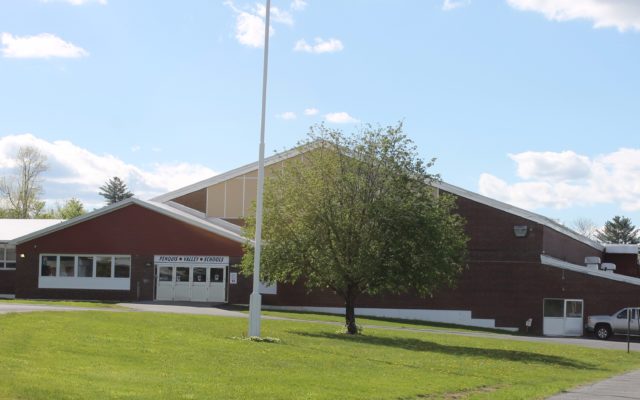
Penquis Valley facility improvements continue
MILO — With students having been back in class for more than a week, work continues on an upgrade to the heating system at the Penquis Valley School as well as an elevator installation for the building.
During a Sept. 4 school board meeting in the library Director of Building and Grounds Donnie Richards said the majority of three dozen heaters arrived earlier in the day. “The piping’s going well, most of the middle school classrooms are done and they’re working through the night,” he said about the contractors.
Richards said before a heater can be put in, the accompanying plumbing work needs to be completed and a delay to this work has put the installation process behind by several weeks.
“We’re getting through the best we can,” he said, saying there will be some chilly mornings to start the day before the project is finished.
Earlier this year SAD 41 voters overwhelmingly approved — 152-25 — a $2.4 million funding package to upgrade the heating system.
The Penquis Valley project has three objectives. The first is to update the steam heating system infrastructure that is beyond its useful life, to improve reliability, comfort, indoor air quality and safety. The other objectives are to reduce annual energy and operating costs and reduce future building repair costs.
The gross projected project cost is $2,414,923, with a little more than $2.1 million for the steam to hot water system conversion, another $190,000 is for LED lighting upgrades and an additional is for $34,700 for building weatherization improvements.
The project is being financed under a 20-year bond through the Maine Municipal Bond Bank. The estimated annual bond cost, fixed for two decades starting with the 2020-21 fiscal year, is $177,694 but there would be various measures in place to reduce the costs.
SAD 41 would have a little more than $19,000 in existing budget savings for energy usage and another $40,000 in operating budget capital contributions. The Honeywell service contract would be reduced by $25,000, the maintenance budget could decrease by $2,500 and for the first year there would be a one-time Efficiency Maine rebate of $29,195.
The first year $61,953 cost is part of the 2019-20 academic year budget. SAD 41’s estimated total net cost, after the various savings measures such as reduced energy expenditures and a reduction in the Honeywell contract, over 20 years would be $744,143. The annual portion of the $744,143 to be paid by the district would vary year by year.
The loan and contract with Honeywell were both executed in late March. Construction began in early June with substantial completion set to be done by late September and the project sign off is Nov. 29.
“The elevator will be done next week,” Richards said about another project at Penquis Valley.
Superintendent Michael Wright said “We are very fortunate to have Donnie who does so many things, sometimes you take it for granted.” Wright then publicly thanked Richards for all he does.
In other business, Brownville Elementary Principal Carol Smith said grade 4 teacher Erica Cianci won a $500 grant from Scholastic Book Clubs. Smith said this news was “the highlight of our week” and the funds will go toward book purchases for the classroom library.
Penquis Valley High School Principal Michael Rollins said the secondary school now has a “Testing & Education Reference Center” with links at https://sites.google.com/msad41.us/penquis-valley-high-school/ and the school’s Facebook page. He said the reference center, with free registration, can assist with PSAT and SAT preparations, prepping for the GED, finding information on colleges and careers and more.
“It’s an amazing resource and the more and more I look at it, I can see it’s going to be great not only for the students but the community as well,” Rollins said, with the Testing & Education Reference Center open to more than just those attending Penquis Valley.
Board member Christine Hamlin brought up the idea of having student representatives on the school board again. The pupils, who have no voting power, can help advise the directors on their peers’ concerns.
Rollins said he would get the word out among the student body.
Board member Russ Carey suggested student council members could serve on the school board on a rotation basis. “That way everyone gets a chance to attend,” he said.